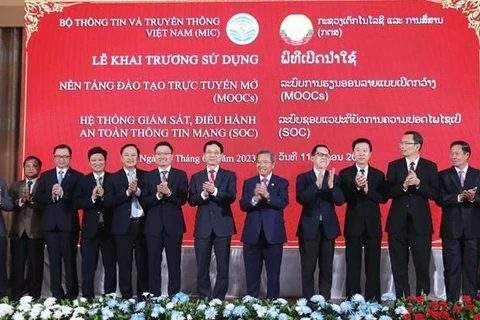 The hospital promotes the application of modern technology such as face recognition in medical examination and treatment (Photo: VietnamPlus)
The hospital promotes the application of modern technology such as face recognition in medical examination and treatment (Photo: VietnamPlus) Hanoi (VNA) – The Hanoi-based Viet Duc (Vietnam-Germany) Friendship Hospital receives nearly 2,000 patients coming for medical examination and treatment every day, however the number of patients who make appointments via the hospital’s hotline 19001902 from January 1, 2022 to November 30, 2022 was only 9,255.
Over the past years, the health sector has seen many changes in the application of technology, particularly in examination and treatment.
However, there are limitations that need to overcome from medical facilities and patients in the process.
Deputy Minister of Health Tran Van Thuan said that over the past two years, the sector has stepped up digital transformation in all aspects. Notably, the sector has successfully implemented a remote medical examination and treatment project and set up 1,000 points connecting health professionals nationwide. However, the number of patients who book appointments through call centre is still modest.
 People use their citizen identification cards to get medical examination and treatment at the Viet Duc Friendship Hospital (Photo: VietnamPlus)
People use their citizen identification cards to get medical examination and treatment at the Viet Duc Friendship Hospital (Photo: VietnamPlus) Associate Professor Nguyen Manh Khanh, Deputy Director of the Viet Duc Friendship Hospital, said the hospital has always paid attention to digital transformation. Since 2020, the hospital has invested 100 billion VND (4.3 million USD) in information technology each year.
The hospital has implemented a state-level scientific project on researching and applying simplified management methods that integrate digitalisation in medical examination and treatment services. It is a new feature of information technology application in the process of examination and treatment in Vietnam.
The hospital has applied technological solutions in the medical examination and treatment process and connected to several steps, including testing, diagnostic imaging, medical ordering, care, treatment monitoring, appointment booking, consultation, and follow-up examination; it has also diversified payment forms and applied non-cash payment methods by using POS, QR Code, e-wallet, bank card swiping, and wire transfer.
In addition to registering for on-site medical examination, for many years, the hospital has used hotline 19001902 for patients to book appointments and enabled them to register online via Bookingcare and Deepcare. It is deploying the registration via the hospital's app to save time for patients.
In response to the Prime Minister’s Decision No.749 on the national digital transformation programme as well as the Prime Minister’s Decision No.505 on the National Digital Transformation Day dated on October 28, 2022, the Minister of Health signed Decision No. 2955 approving a plan on promoting the development and use of digital platforms in the health sector.
With a vision to 2030, the health sector aims to apply digital technology in most of its activities to form a smart healthcare system with three main contents, including smart healthcare for disease diagnosis and prevention, smart medical examination and treatment, and smart medical management.
Deputy Minister of Health Tran Van Thuan has acknowledged limitations in the application of information technology in medical examination and treatment facilities, including underdeveloped infrastrutre and equipment which are not commensurate with the volume of medical data to be managed; information systems and databases are unsynchronised, lack of hi-quality human resources in information technology, among others. The limitations have expanded the gap in information technology development between public and private hospitals at diffirent levels.
In the time ahead, the ministry will focus on developing guidelines for the transformation in medical examination and treatment; the process of implementing electronic medical records to ensure data security and safety; amending criteria for evaluating hospital quality in the direction of digital transformation./.























